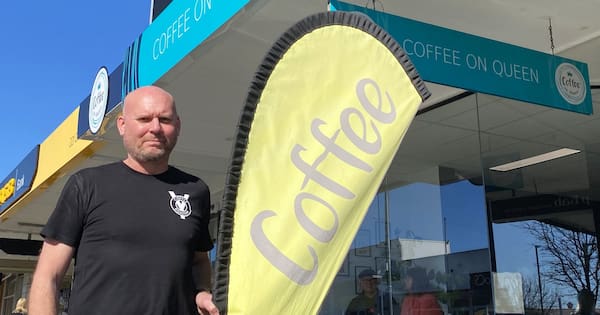A Richmond retailer says rules banning advertising flags from the street would cut his revenue by hundreds of dollars.
Coffee on Queen owner Matt Redwood said his flag was “essential” to his business.
“At the moment, 90% of our customers that I’ve asked how they know we’re open, they go: ‘we see the flag’.”
The Queen St café opens at 4.30am, and putting the flag on the edge of the footpath brings in about $200–300 a day, he estimated, and ensured the employment of up to four workers.
However, Tasman District Council’s new bylaw for public places, adopted in November 2024, bans their use.
Last week, Redwood presented to the council about the flags’ importance to local businesses and said he was supported by around 20 other retailers.
He said the council should have been more deliberate in its consultation with local businesses and sent a staff member down Richmond’s main street talking to them in person.
“We appreciate that we do get emails sent out, but talking to a lot of businesses, a lot of them blend into each other – these emails. We haven’t got enough time in a day.”
Retailers are now limited to just one display, which must be a sandwich board, that must be placed against the kerb to leave 1.8m of unobstructed footpath.
However, the signs were often made “null and void” the moment a car parked beside them.
“It’s worrying me big time, and it worries a lot of businesses… we are losing money every day if we don’t promote ourselves,” Redwood said.
“I believe that if we keep bringing these little laws in, with not having flags, not trying to promote businesses, [not] trying to make the place look vibrant, we will become Nelson – a dead city.”
Raymond Griffith, chairman of business association Richmond Unlimited, said it was “unfortunate” that the council was enforcing the flag rules when the country is seeing a “sharp rise” in the closure of retail and hospitality businesses.
“When considered in the context of their locations and surrounding street furniture, it’s understandable that business owners question the need for these flags’ removal,” he said.
“Richmond Unlimited is committed to working constructively with the council to find a solution that allows our members to promote their businesses while also addressing any perceived safety concerns for vulnerable members of the public.”
A Tasman District council spokesperson did not confirm if it was engaging with Richmond businesses on the issue, but said that disability advocacy was a theme of its early engagement and consultation on the bylaw.
“While the Blind Low Vision Community had a preference for no signs – either sandwich boards or flags – it was indicated that flags were the most disruptive form of advertising due to their movement.”
Indeed, Kaye Halkett, one of the three presenters to the hearing panel that was considering the bylaw while it was a draft, said flags were “the worst” form of retail display.
“They flutter around in your field of vision… navigating in this sort of environment is absolutely exhausting. It plays havoc on the brain,” she told the council in September 2024.

The council received 35 submissions on its draft bylaw, and 27 submitters gave their preference on the retail display rules that had been proposed.
Fifteen submitters agreed with the proposed rules while 11 disagreed. One had no opinion.
Council staff commentary about the written responses supplied also said that many of those who disagreed with the rules wanted all retail displays banned.
Non-compliant retailers displaying a flag risked a $500 fine, though the council said it prioritised working alongside the community to support compliance before undertaking enforcement action.
The bylaw will be reviewed in four years.
Local Democracy Reporting is local body journalism co-funded by RNZ and NZ On Air













